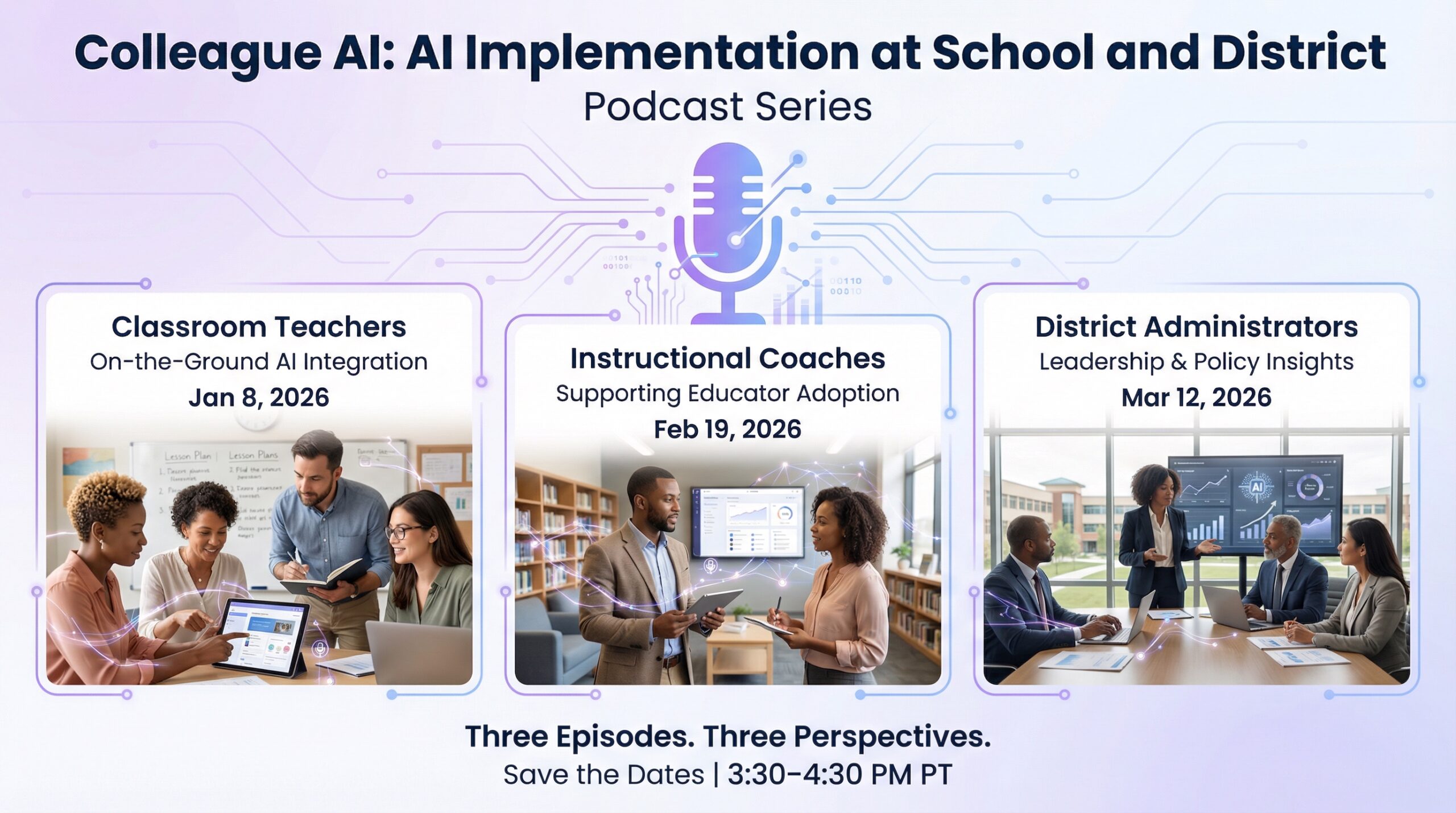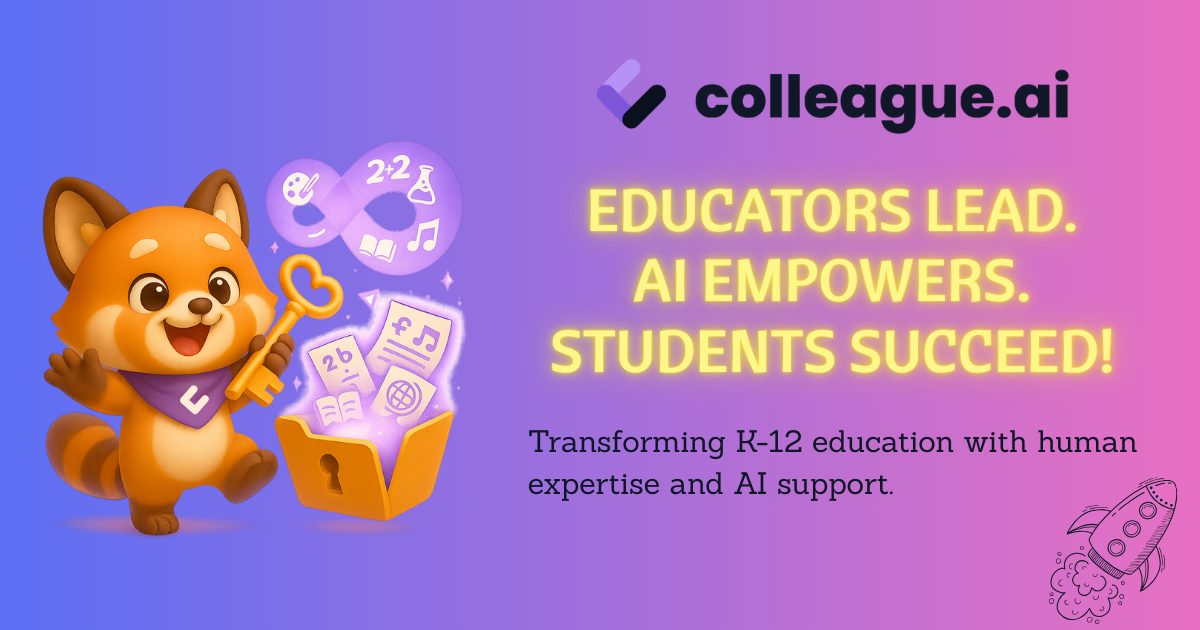The idea of building custom chatbots has surged in popularity among school leaders and educators. Schools and districts are increasingly drawn to the promise of AI tools that can retain contextual information specific to their operations—such as staff and student handbook, common instructional frameworks, and curricula tailored to their unique needs (Johnson & Smith, 2023). A chatbot that “knows” a district’s teacher evaluation rubric or grading policy could streamline decision-making and reduce administrative burdens. Yet, as appealing as building your own GPT-style chatbot sounds, it comes with significant challenges that can undermine its quality and trustworthiness, particularly in high-stakes educational settings. At Colleague AI, we propose a practical middle ground: CoreDocs Assistant. This approach empowers district leaders and educators to leverage AI for context-aware content generation without the complexities of becoming AI engineers and researchers. We owe gratitude to Camille Jones, Shawn Fuller, and Nikolas Bergman who are from Quincy School District in Washington State for their initial brainstorming and recommendation of such function.
The Allure and Challenges of Custom Chatbots
Custom chatbots hold potential for organizational efficiency. By embedding institutional knowledge, they can provide answers grounded in a district’s specific policies or practices, ensuring consistency and relevance (Brown et al., 2024). For example, a principal querying about teacher evaluation could receive responses aligned with the district’s framework, saving time and reducing errors. However, creating and maintaining such tools is far from straightforward. Here are three key challenges:
- Advanced Prompting Skills Required: Building a reliable chatbot demands sophisticated AI prompting skills, which most educators don’t have the time or training to develop. Crafting prompts that consistently yield accurate and contextually appropriate responses is an art and science, often requiring iterative refinement (Lee & Patel, 2023). Expecting school leaders to master this alongside their core responsibilities is challenging.
- Ongoing Evaluation and Adaptation: Even a well-designed chatbot can falter as foundational AI models evolve or user behaviors shift. For instance, updates to large language models (LLM) can subtly change how prompts perform, potentially leading to misaligned responses (Gupta & Chen, 2024). Moreover, LLMs respond differently based on users’ prompts. If users’ prompt styles and behaviors change, a previously well-designed chatbot may break as well. In high-stakes contexts—like advising on discipline policies or grading disputes—such inconsistencies pose serious risks. Educators would need to continuously monitor and tweak their chatbots, diverting focus from teaching and leadership. Researchers and engineers at the AmplifyLearn.AI Center at the University of Washington, who have contracted with EdTech startups to evaluate the quality of custom AI chatbots, have found it very challenging to develop an evaluation framework and establish an automated evaluation process. Many steps require humans who are both AI and domain experts to remain in the loop.
- The Black Box Problem: Once a chatbot’s prompts are wrapped in a user-friendly interface, the logic behind its responses becomes opaque. This “black box” effect erodes trust between creators and users, as educators can’t easily verify whether the AI is referencing the right policies or data (Thompson & Rivera, 2023). In education, where transparency and accountability are paramount in building trust among educators and students, this lack of clarity is a significant barrier.

Caption. The Challenges of Custom Chatbots Offered to Educators
Colleague AI’s Solution: CoreDocs Assistant
At Colleague AI, we’ve developed CoreDocs to address these challenges while delivering the benefits of context-aware AI. Our approach allows trusted district leaders to upload foundational, core documents—such as teacher evaluation frameworks, grading policies, or curriculum guidelines—into a secure system. Our research and technology teams then embed these documents into a contextual knowledge graph tailored to the organization. When users query the system, our AI automatically references relevant documents to generate accurate, policy-aligned responses.
For example, if a teacher asks, “What are the criteria for evaluating my performance?” the system draws directly from the district’s uploaded teacher evaluation framework. If another teacher queries about grading practices, the AI references the district’s grading policy. This ensures responses are not only relevant but also grounded in the organization’s established guidelines.
Benefits for Educators and Leaders
Our CoreDocs offers several advantages that empower educators and district leaders:
- Context-Based Efficiency: By rooting responses in organizational documents, users receive answers that are immediately applicable, reducing the need to sift through generic or irrelevant information. Studies show that context-aware AI systems can improve decision-making efficiency by up to 30% in professional settings (Wang & Lee, 2024). For busy educators, this means more time for teaching and leading.
- Expert-Built and Maintained: Our professional research and technology teams handle the heavy lifting—building the knowledge graph, structuring the AI, and regularly evaluating its performance for accuracy, relevance, and usefulness. This alleviates the burden on educators to become prompt engineers or AI researchers. We draw on best practices from AI evaluation frameworks to ensure consistent quality, allowing school leaders to focus on their core mission (Martinez & Zhou, 2023).

Caption. Our CoreDocs Assistant Offers Several Advantages that Empower Educators and School Leaders
Looking Ahead
CoreDocs will launch in summer 2025 as part of Colleague AI’s broader Organizational Intelligence Suite, designed to support schools with smart, secure, and user-friendly tools. Alongside this feature, educators will be able to attach learning materials to guide student discussions, further integrating AI into classroom workflows.
The dream of custom chatbots doesn’t have to be a distant or risky endeavor. With CoreDocs Colleague AI offers a balanced solution—one that harnesses the power of AI while respecting the realities of educators’ time, expertise, and need for trust. By grounding AI responses in your district’s foundational documents, we’re helping you work smarter, not harder, to create thriving learning environments.
References
- Brown, T., et al. (2024). AI in Education: Opportunities and Challenges. Journal of Educational Technology, 45(3), 112-129.
- Davis, R., & Kim, S. (2024). Trust in AI Systems: A Study of User Perceptions. AI Ethics Review, 12(1), 45-60.
- Gupta, A., & Chen, L. (2024). Evolving AI Models and Their Impact on Prompt Engineering. AI Research Quarterly, 18(2), 78-92.
- Johnson, M., & Smith, K. (2023). Contextual AI for Institutional Knowledge Management. Educational Administration Review, 39(4), 201-215.
- Lee, J., & Patel, R. (2023). Prompt Engineering in Practice: Barriers for Non-Experts. AI and Society, 28(5), 134-149.
- Martinez, E., & Zhou, H. (2023). Evaluating AI Performance in Dynamic Environments. Journal of AI Systems, 10(4), 88-103.
- Thompson, L., & Rivera, J. (2023). The Black Box Problem in AI Adoption. Technology and Trust Journal, 15(2), 66-80.
- Wang, Q., & Lee, T. (2024). Context-Aware AI and Decision-Making Efficiency. Journal of Applied AI, 22(1), 33-47.





